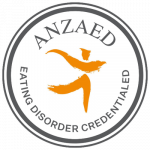LET’S WORK TOGETHER!
A little about eating disorders
Eating disorders are not uncommon, estimates on prevalence suggest up to 16% of the population have an eating disorder, the proportion of adolescents who have disordered eating is even higher (approximately 1/3).
A lot of people think eating disorders and think Anorexia Nervosa. Well that’s only 3% of people with eating disorders. There are other forms of eating disorders that account for the other 97%!
The impacts of having an eating disorder is far reaching: medical complications, mood, self esteem, suicidal ideation, etc.
Now is the time to save the life you are entitled to live”
Kate Hudson-Hall, Bulimia Sucks!: 10 Simple Steps to Stop Bingeing and Purging
Useful links for patients/clients/carers
- Do a screener- see if you should be concerned about your own or a loved one’s eating: https://insideoutinstitute.org.au/screener/
- Complete a more detailed assessment: https://insideoutinstitute.org.au/assessment/
- The Butterfly foundation including a nation-wide hotline, factsheets for clients and carers. https://butterfly.org.au/
- Information about Medicare rebates for those with eating disorders: https://insideoutinstitute.org.au/medicare/
- Eating disorders family Australia: https://edfa.org.au/
- Monitoring tool: https://www.recoveryrecord.com/


Useful links for GPs/ carers
- This is the link to the Queensland Health Eating Disorders Service https://www.qld.gov.au/health/services/specialists/queensland-eating-disorder-service-queds
- Find relevant clinicians in your area: https://insideoutinstitute.org.au/treatment-services/
- InsideOut offers excellent training resources: https://insideoutinstitute.org.au/
- This is the link to the National Eating Disorders Collaboration https://nedc.com.au/eating-disorders/eating-disorders-explained/the-facts/whats-an-eating-disorder/
WE WORK WITH
Different types of eating disorders
The following information about some of the types of eating disorder comes directly from NEDC.
Anorexia Nervosa. A person with anorexia nervosa will experience significant weight loss due to food restriction and starvation together with an intense fear of gaining weight.
Bulimia Nervosa is involved with the experience of a lack of control. A person will eat a large amount of food within a relatively short period of time. The person will often feel guilt and shame during or after the episode and will engage in compensatory behaviours with the intention to prevent weight gain.
Binge Eating Disorder. A person with BED will experience a sense of lack of control and will eat a large amount of food within a relatively short period of time. Binge eating often evokes feelings of guilt and shame, and a person binge eating may eat alone or be secretive about their eating habits.
Avoidant/ Restrictive Food Intake Disorder (ARFID) is ARFID is more than just ‘picky eating’. People with ARFID may avoid or only eat small amounts of food, or limit variety of foods leading to nutritional deficiencies but this is not related to distorted body image.
“I also know that I have forgiven myself. And that it’s okay to laugh at your mistakes, even the dangerous dumb ones.”
Callie Bowld, What Goes Down: The End of an Eating Disorder
The role of psychology in the treatment of eating disorders
Everyone is different. Karen works with individuals to find the best evidence-based treatment for their eating disorders presentation. Karen works together with the rest of your treatment team (doctors, dietitian, etc).
Karen’s usual therapeutic frameworks for the treatment of eating disorders is CBT-ED (a form of evidence-based Cognitive Behavioural Therapy specifically designed for eating disorders) and RO DBT. Both approaches provides clients with tools and education to self managed in the longer term.
RO DBT is particularly matching for patients who have restrictive food intake and ARFID presentations.
Interested in treatment?
Karen is a credentialed eating disorders clinician. This means other than her postgraduate training in clinical psychology, Karen also has undertaken extra training in the provision of eating disorders treatment and is committed in ongoing learning and development in this area.

Karen also maintains a separate waitlist for clients/patients with an eating disorder. Due to the level of care required in the treatment, Karen can only take a limited number of patients with eating disorders at a time. If you are interested in being put on the eating disorders waitlist with Karen, please email us (hello@drkarenli.com.au) with the following:
- Full name
- Eating disorders referral from your GP/psychiatrist
- Mobile number and email
There is a network of professionals who are credentialed to provide eating disorders treatment: https://connected.anzaed.org.au/treatmentproviders/